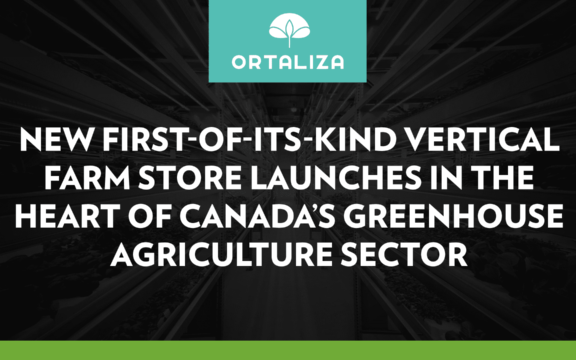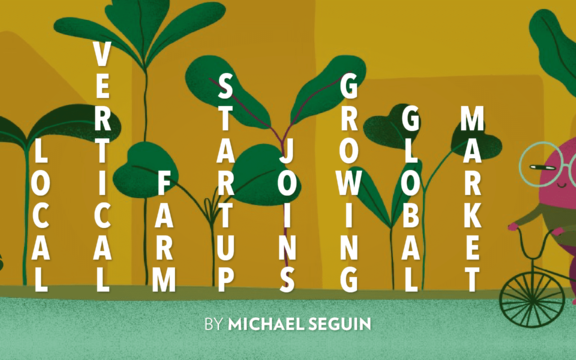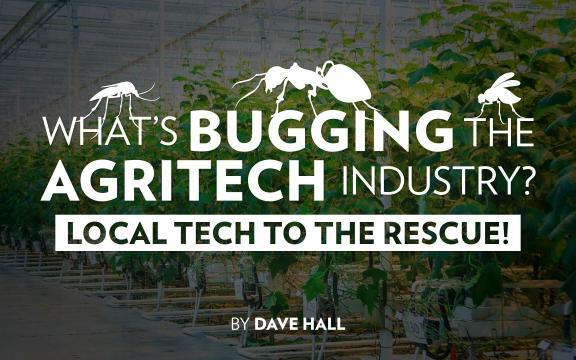What do you think of when you think of farming?
A man waking up at the crack of dawn to the crowing of a rooster? That same man slipping on a wide-brimmed straw hat and a pair of splattered overalls before venturing out into the predawn haze? Shouldering aside the heavy barn doors and tending to his cattle? Wandering through golden fields of grain armed with a scythe? A medieval surf dragging a bronze plow through fields of mud?
Yes, most of us have a tragically narrow and oftentimes antiquated view of farming. And this is despite how many hours and hours we aging Millennial’s pumped into Farmville.
What many of us don’t know is that, as our region continues to embrace new technologies and the spirit of innovation, farming is no exception. In fact, a number of businesses have cropped up (pun very much intended) in the last several years that have spearheaded a whole new sector of farming – agritech!
Agricultural technology, or Agritech for short, is the use of technology in agriculture, horticulture and aquaculture to improve yield, efficiency, and profitability.
Agritech companies currently make up roughly 10% of WEtech Alliance’s active client portfolio. Adam Castle, WEtech’s Director of Venture Services, weighs in with the inside scoop.
“The Canadian Agriculture landscape is the perfect point of convergence for technology, manufacturing, and sustainability. While the job of farmers is fundamentally the same as it has always been, there are so many forces at play making the marriage of farming and tech not just good for business, but the way forward to ensure that business continues to be sustainable in the future.” states Adam.
According to a 2017 Overview of the Canadian Agricultural Innovation System by Agricultural Institute of Canada, Canada is the fifth-largest global exporter of agri-food products, generating export sales of $55 billion – 5.7% of the total value of world food and agriculture exports.
“We Grow for the World” isn’t just a tagline for Chatham-Kent. The region literally leads the world in production of over 70 crop varieties, from fruits to vegetables to plants and grains.
For over 25 years, Woodstock has been the home of Canada’s Outdoor Farm Show, where farmers can learn about the newest and most innovative products and technology in agriculture. As a result of the global pandemic, the show has moved to an online digital platform in 2020 and 2021 to continue to bring farmers relevant news and updates that could benefit their operations, with two additional small-scale in-person events scheduled for later this month.
Feeding the world’s growing population
The fact of the matter is that by 2050, the world’s population is expected to reach almost 10 billion. Increasing the global demand for food, while the amount of land used for farming continues to shrink, as more and more of those hungry mouths, also means more room needed to house them.
As if that challenge wasn’t big enough, climate change, urbanization, labour shortages, and a globalized economy are all additional forces of influence that weigh directly on agriculture.
So if you’re a farmer, how do you grow more food, for more people, in shorter growing cycles? Technology.
The field of agritech is growing exponentially, and by 2025 is expected to be a $729.5 billion industry that at its core, is about reinventing how farms are operating, bringing together software, process transformation, and big data analytics.
One such business is THEMUSHHUB CO., operating out of Walkerville.
“I grew up on mushroom farms in Asia, Europe and North America,” Denis Vidmar, the Owner of the THEMUSHHUB CO., explains. “I’ve been designing this business since I entered the mushroom industry 15 years ago.”

THEMUSHHUB CO. produces a vast selection of plant-based, vegan and gluten-free fungi foods, which can be used to make pierogies, pies, lasagnas, stroganoffs and so much more.
“Many communities across our planet have consumed mushrooms for thousands of years,” Denis states. “Primarily for medicinal purposes. A lot of research articles out of Asia support their health benefits. Fortunately, we are starting to see some research now here in the West.”
The company utilizes vertical farming techniques to grow their amazing products.
“Our setup here can be replicated in any single part of the world,” Denis explains. “We have the capacity to grow thousands of fresh products here in Walkerville. In terms of all the products you might find in the produce aisle, mushrooms are actually the best for the environment in terms of yield per gallon of water.”
“Technology has changed farming so much.”
All these innovations, Denis stresses, are emblematic of the evolving role of technology in farming.
“Technology has changed farming so much,” says Denis. “One of the biggest challenges in the mushroom industry is the manual labour. Picking mushrooms is a very tedious, very repetitive job. Mushrooms take a lot of work to pick. But some companies have started using AI robots to run down the whole bed, pick the mushrooms and arrange them by size!”
“There’s a huge shift of people that are taking our industry to the next level using technology,” adds Denis. “Already, local companies like Ortaliza have started embracing this new wave.”
Another local champion of agritech is Mantra Farms, founded by Vikas Varma.
“We set out to make a more sustainable farming business,” Vikas states.
Mantra Farms is an absolute powerhouse in terms of eco-friendly farming. Thanks to their adoption of vertical farming technology, they have been able to reduce their water usage by 98% (while also recycling 100% of the water they do use!), and limit pathogens thanks to a 95% drop in human interaction with plants. All their plants are hydroponically grown without any pesticides.
“I met Vikas early on at the EPICentre,” Adam recalls. “His ideas are really interesting. His model of food growth is going to become more common in high density urban environments, because the technology is getting so good. Thanks to vertical farming, you can grow such a large amount of food in such a tiny amount of space.”

Windsor-based Splice Digital’s IPM Scoutek software, winner of WEtech Alliance’s 2019 ScaleUP Tech Accelerator powered by Libro Credit Union, allows greenhouse operators to monitor their pest management systems in real-time, to help them maximize crop yield while at the same time identifying pest control issues and diseases.
“This software improves the speed and accuracy of scouting, pest management and the traceability and cost of sprays and biologicals,” says Carrie Izsak, co-founder and CEO IPM Scoutek, in a recent feature with Greenhouse Canada.
“While most software companies build software that check functional boxes, we create software that people want to use, from its well-architected interface, to its visual appeal, to the relentless struggle for fewer clicks and less user work,” adds Carrie.
So, you’ve selected, planted, maintained, harvested and packaged your crop. Now what?
Enter Windsor’s EZCrops, a web-based platform and mobile app that simplifies, streamlines, and automates the buying and selling operations of wholesale produce from anywhere, anytime.
EZCrops platform allows sellers to post their ads, set up exclusive pricing for special buyers, automatically manage orders and notify buyers when an order is complete. With a single click of a button, buyers can also purchase fresh, wholesale produce from sellers of choice, and stay up-to-date on the buying options for select commodities.
Supporting Agritech Growth
A surefire way to measure the growth of the agritech sector is to follow the money.
Conexus Venture Capital recently announced a second venture capital fund, Emmertech, focused on Canadian agritech and agribusiness innovation. Among its founding investors is Libro Credit Union, the largest credit union in southwestern Ontario which has the largest ag lending portfolio of any credit union in Canada, which will invest $2 million over the next five years in the fund.
Libro’s involvement means that some of the investment will be directed to southwestern Ontario startups – companies that aren’t yet ready for traditional lending offered by financial institutions.
“We’re supporting a shift in Canadian agritech to a younger, more tech-savvy farmer,” said Steve Bolton, CEO and President of Libro Credit Union. “This is going to fundamentally change how farming operations are conducted.”
It sure is.
That tragically narrow and oftentimes antiquated view of farming is changing. This isn’t Farmville. These are just a few of the many new faces of agritech.

Michael Seguin was born with a pen in his hands and too many words floating around his skull. Since then, he’s worked tirelessly to get them out. Unfortunately, more keep taking their place. After university, he began dabbling in marketing and journalism. At the age of 26, he became the first in-house writer at Windsor Life Magazine, an esteemed local publication. As WEtech Alliance’s In-House Storyteller, Michael is dedicated to lending a voice to the tech sector around Windsor and Chatham-Kent.



























































































